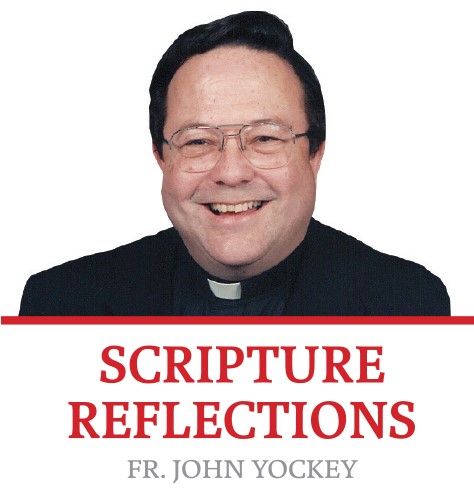Scripture Readings
Fourth Sunday of Advent
2 Samuel 7:1-5, 8b-12, 14a, 16
Romans 16:25-27
Luke 1:26-38
A devotional companion for our Advent journey is the rosary. The first Joyful Mystery or Manifestation of God’s saving power is the Annunciation, Sunday’s Gospel. The second mystery in the sequence rounds off Luke’s opening chapter. God’s power inspires Mary to travel in haste to the hill country and assist her elderly relative Elizabeth immediately.
The more these inseparable events become part of our own spirituality, the deeper our experience of the third Joyful Mystery, the birth of Mary’s Divine Son.
We learn how to follow Jesus when his mother was a poor, peasant girl, about 14-15 years old. She lived quietly with her family in remote Judea, then an occupied Roman province. Alone in prayer, the angel Gabriel suddenly appeared and startled her with the loftiest greeting ever addressed to a human: “Hail, full of grace!”
Sunday’s second reading praises God, who renews all sinners when we accept the marvel of our redemption in Christ. However, Mary of Nazareth stands forever as our nature’s “solitary boast.” (Gerard Manley Hopkins, SJ)
In his eternal now, the Creator predestined Mary for sanctifying grace from the first moment of her conception. No stain of sin could ever touch her because of her unique blessing, clothed with the victory of her son’s cross from her very beginning. Full of God, never of herself, she would exercise authentic freedom and generously do the Lord’s will as soon as she discerned it.
She is the first disciple of the son she bore. Her listening heart, which Gabriel encountered, models the prayerful stance Jesus asks us fellow disciples to follow. Rather than rattle off a grocery list of requests as we babble on one-sidedly, let us just slow down, really listen to what’s happening inside and around us, and wait for the Lord to take the initiative.
Mary stayed open to his touch, usually in her daily routine. The angel’s astounding news startled her for sure, but her trust didn’t waver an iota. She dialogued, she didn’t shrink, and felt comfortable asking him for further insight. Once he summed up that nothing is impossible with God, she opened her life to embrace a plan she couldn’t fully understand.
Providence prepared her to become the God-Bearer, who brings her compassionate son to each of us in need of his healing mercy. Her charity began at home but couldn’t stay there by its inner thrust. While God the Son took flesh and was growing to full term in the tabernacle of her womb, she knew she had to visit Elizabeth, an older woman, carrying John (the Baptizer) in her sixth month.
She answered divine prompting at no small risk to herself. Sanctifying grace cast out any fear. Luke implies that she traveled the good distance herself. She was young, presumably attractive, and the hills she had to traverse were infested with bandits. No matter. She accepted the challenge.
She arrived safely. We can imagine the tear-filled joy Elizabeth shared when they warmly hugged. “Who am I that the mother of my Lord should come to me? … Blessed are you who believed that the Lord’s word to you would be fulfilled.” (Luke 1:43,45)
Mary shows us lived prayer. Conversation with God begins with God. We listen patiently for his movement in our heart. His favorite language seems to be silence. We wait for his touch and respond with or without words, as we are drawn. Our encounter is genuine when he draws from us concern for others and the needs of our human family. Praise him for his crowning gift if he clarifies how we can better serve.
The Women’s Support Center of Milwaukee mailed just the right Advent card. Artist Michael Rieser’s “Christmas Eve” shows Joseph walking ahead of Mary into a rough-hewn stable. The message reads: “May your heart be open to receive Joseph and Mary this Christmas, so that the Holy Child will have a place to be born.”
That’s excellent advice to round off our preparation.
For Reflection
Is there a biblical basis in Gabriel’s greeting for our dogma of Mary’s Immaculate Conception?
How does your devotion to Mary make you more Christ-centered?
Martin Luther died holding a rosary. Can you help non-Catholic Christians see how the veneration of saints enhances our worship of God?

